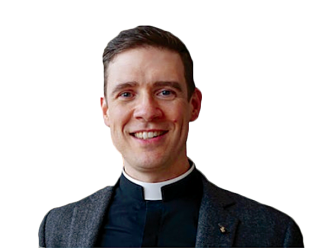
Andrew Bennett
The Reverend Andrew Bennett is a deacon of the Ukrainian Catholic Eparchy of Toronto and Eastern Canada.
Jesus’ victory over death is unchanging
During this month when Roman Catholics mark the month of the Holy Souls death is perhaps more top of mind for many of us as we remember our family members and friends who have died. What is our attitude to death in the 21st century Church? Does it remain faithful to a view of death that is illumined by the light of Christ’s suffering and death on the Cross and His resurrection on the third day? Or, have we come to understand death in a distorted way, shorn of its salvific character? I recently explored these questions in my latest missive to a network of pastors I regularly write to through my work at the Christian think tank Cardus. The following is drawn from that text:
Key creative works Catholics should read
One question I regularly ask the young adults I minister to as a deacon at St. John the Baptist Ukrainian Catholic Shrine is Ottawa is: “What are you reading?” Many do not read a great deal beyond obligatory work for their courses in university, and almost all of it is non-fiction. Thankfully, many read devotional works and the Holy Scriptures, which is certainly laudable, but I press them: “When was the last time you read a novel or a collection of poetry?” Most reply “I cannot remember,” or, “I don’t like fiction or poetry.”
Helping Catholics grow as people of The Book
People new to, or wishing to grow deeper in faith, often ask me to recommend good Catholic books. The height of understatement is to say coming up with such a list is a daunting challenge in a tradition that, beginning with the Holy Scriptures, has an almost inexhaustible treasury of books.
Put aside politics for incarnational truth
Some of you may remember a folk rock band from BC that was moderately popular in the 1990s named Spirit of the West. One of their hits was titled “Political”. Detailing the sentiments of one looking back on a failed relationship, the chorus queried “Why did everything, every little thing, every little thing between you and me have to be so political?”
Parishes answer the scandal of squalor
The number 8 bus travels down Main Street in Mount Pleasant, a neighbourhood in Vancouver known for its trendy shops, trendier cafes, and urbane urban dwellers. As the bus passes the numbered avenues running west and east off Main it eventually makes its turn onto East Hastings Street. The last time I was at the corner of Main and Hastings was in 2004 when I worked as a federal public servant. My colleague and I were making a cross-country tour in aid of the Government of Canada’s desire to understand the federal role in cities better.
What makes you Catholic?
What does it mean to be a Catholic? The realities of the Church in the world today make it unfortunately quite complicated to answer this question.
Fiction that reveals the truth of Christ
Some readers who, like me, have a fondness for a good English novel, particularly those with a Catholic bent, will be familiar with the works of Fr. Robert Hugh Benson (1871-1914). Benson ranks among the great 19th and early 20th century Anglican converts along with Evelyn Waugh, Ronald Knox and St. John Henry Newman. Each of them left behind a significant corpus of writing that continues to delight and inspire us today.
Friendship as the path to sainthood
Have you watched the series The Chosen? If yes, then you like me have been treated to a well-produced and Biblically-faithful, yet embellished account of Our Lord’s earthly ministry. The manner in which Jonathan Roumie portrays Jesus Christ is very human and relatable without diminishing His divine nature, thereby being faithful to the Gospel. Our Lord is shown to delight in beauty. He is joyful, laughs and enjoys a good meal. And He heals and demonstrates the divine insight into people’s lives that only He has.
Finding the truth by seeing God’s beauty
As we journey through our life as Christians, seeking to grow in faith and wisdom, we discover we are hard-wired as human beings that bear God’s image and likeness to seek truth, beauty and goodness. These are properties of being, of God. He reveals this to Moses in Exodus chapter 3 when Moses asks God what His name is. God tells him, “I AM WHO I AM.”
The celestial music of God’s created order
One of the most deleterious effects of our present culture has been our failure to engage in regular contemplation of what is real, that is to wonder at things. The end of wondering is not to gain complete knowledge, though this is the not-so-implicit goal inquiry in our post-modern world. We contemplate the mystery of God, but we cannot fully understand Him since He is God and we are His creatures. If we claim a full comprehension of who God is, what we comprehend is not God at all, or as St. Augustine wrote in Sermon 117, “Si comprehendis, non est Deus,” if you understand, it isn’t God. To contemplate does not aim at full comprehension. It desires to participate in what is a mystery to us, something hidden or not yet fully revealed.

